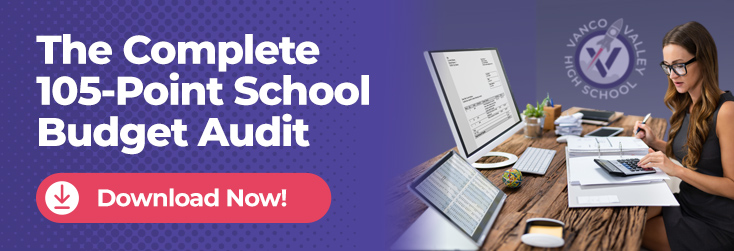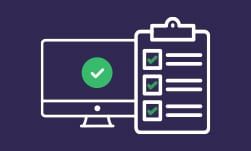
Introduction
Financial accounting for schools involves reporting and recording the institution's economic activities, including tracking, reporting and auditing all income, expenses and asset changes and managing school revenue streams. It ensures transparency to stakeholders and helps the school maintain compliance.
However, ensuring accurate accounting can be challenging, especially considering the different requirements for public and private schools.
This article will explain how to overcome financial challenges and ensure your school maintains compliance.
Table of Contents
- Common Challenges of Financial Management in Schools
- Accounting Problems Unique to Public vs Private Schools
- Compliance and Regulatory Risks
- How to Overcome Financial Challenges in Schools
- Best Practices: Financial Management Checklist for Schools
- Free Budget Planning and Accounting Guide for School Finance Professionals
Common Challenges of Financial Management in Schools
Most schools struggle with tight budgets, complex transactions and changing regulations. This makes financial accounting critical, as every penny needs to be accounted for. That's why we're sharing the five biggest accounting challenges schools face—and how to fix them.
| Challenge | Impact |
|---|---|
| Budget Constraints & Funding Gaps | Delayed program funding and limited educational resources |
| Audit & Compliance Issues | Risk of penalties, fines, or loss of funding |
| Recordkeeping Errors & Inconsistencies | Inaccurate financial reports and reconciliation challenges |
| Lack of Skilled Accounting Staff | Increased reliance on manual processes and higher error rates |
| Inadequate Rainy Day Revenue Planning | Unprepared for emergencies or unexpected expenses |
Budget Constraints and Funding Gaps
School budgeting issues are often related to limited financial resources and face constraints in funding various programs and activities. A TCF report reveals that K-12 schools throughout the U.S. are underfunded by nearly $150 billion annually. Not much is being done to address funding limitations, and operational costs keep growing.
Although schools can seek out more funding opportunities, they can also benefit from managing funds effectively. Following strategic budget management techniques can reduce the challenges of financial management in schools, so they maximize their available resources and ensure a high quality of education:
- Prioritize spending by identifying the most critical needs and allocating funds accordingly.
- Review and assess expenses regularly.
- Seek cost-effective alternatives.
- Budget forecasting for schools ensures a smart approach toward financial needs and challenges.
- Encourage community involvement and financial partnerships.
- Invest in ongoing training and staff development.
To understand these strategic budgeting techniques, imagine a small private institution facing declining enrollment and rising expenses. To overcome this, the school's finance team analyzes expenses to reduce costs without compromising educational standards. They then adopt a zero-based budgeting approach and implement cost-saving measures like bulk purchasing and energy-efficient practices.
Compliance Issues
State and federal laws, as well as local regulations and guidelines, require schools to adhere to educational financial reporting and fund accounting. Failure to comply can result in hefty fines and penalties or, at the most extreme, a school closure.
Schools can miss the compliance mark if they are unfamiliar with the generally accepted accounting principles (GAAP) that guide them in their work. GAAP is a set of accounting principles, standards, and procedures that combines authoritative standards set by policy boards with commonly accepted practices.
Statistics show some or all school districts are required to follow GAAP in 34 states. However, these guidelines can benefit administration, regardless of the requirement.
Fortunately, school administrators can access books, tools and resources to help them learn more about GAAP and manage compliance effectively. Additionally, accounting software comes with built-in compliance features, compliance management platforms and online resources provided by regulatory bodies, ensuring everything is done by the book.
Audit Issues
Audits are mandatory for schools to ensure compliance. However, many schools don't fully prepare for audits. They may not have the documents required when audits roll around, leading to fines and penalties.
Schools can prepare for audits by:
- Understanding the Audit Process and Scope: Administrators should understand what the audit process involves and the audit goal to ensure they are prepared.
- Provide Documentation: Auditors will require documentation that proves that financial transactions were made and ensures their necessity. Administrators should gather these documents in advance and provide them as needed.
- Implement Strong Internal Controls: Internal controls should be implemented and enforced throughout the years. Staff must understand their financial responsibilities and follow policies and procedures to ensure compliance. Annual alignment means readiness when audits occur.
- Ongoing Communication: Staff must communicate with one another to ensure everyone is updated on financial procedures. This approach gets everyone on the same page and allows the team to relay accurate information to auditing organizations.
Recordkeeping Errors and Inconsistencies
Recordkeeping errors and inconsistencies are other issues in schools' financial accounting. Common ones include:
- Misclassification: Bookkeeping requires accurate classification of different expense and revenue types. When accounts aren't accurately classified, it can skew reports, make it difficult to budget for projects and lead to compliance issues.
- Missing Receipts: Auditors typically want to see receipts for various expenses. Fortunately, most are calculated as digital transactions in banking statements. However, it is wise to have proof of transactions made with cash or cashier's receipts.
- Reconciliation Errors: Reconciliation is one of the best ways to ensure accounting accuracy. However, errors can occur within the reconciliation process, impacting accounting results.
School accounting errors are often human mistakes that are difficult to avoid. However, they can be minimized with team oversight. Modern software programs also prevent errors in financial accounting for schools.
Lack of Skilled Accounting Staff
A skilled accounting staff can help schools achieve accurate financials. They also tend to be trained in accounting software that ensures accuracy.
However, due to limited funding, schools may not have the budget to hire these professionals or purchase these systems. As a result, they hire staff with minimal experience who are prone to making mistakes. They may also use manual spreadsheets that increase the risk of human error.
Schools can overcome these issues by:
- Training existing staff: Although this is a solution, it requires time and money. Schools may be better off hiring experienced professionals from the get-go.
- Private Fundraising: Schools may launch fundraising initiatives to raise enough money to purchase better equipment or hire more experienced staff.
Generating Revenue for a Rainy Day
We work with 13,000 schools across the country, and we constantly see that no matter how great the accounting or budgeting is, unforeseen expenses turn up, and with the state of funding today, there isn't an additional well to draw from.
This is why so many schools need to turn to fundraising. If you want to expand your school's fundraising efforts, we created a complete kit with 13 tools and templates. You'll also receive access to 100+ bonus fundraising resources. Simply click the button below to access the material.
Spirit Wear
While schools have various fundraising options, spirit wear is one of the most overlooked additional revenue sources. We work with many public and private schools that see a constant stream of surplus revenue from doing spirit wear fundraisers or simply creating an online store that generates cash while you sleep.
If you're interested in starting or expanding your existing spirit wear efforts, check out our free Kit, which is packed with free tools, templates, and resources.
Access the spirit wear kit out today!
Accounting Problems Unique to Public vs Private Schools
Accounting problems can vary depending on whether the school is private or public. The following sections will review the unique issues that arise.
Public School Accounting
- Fund accounting: With public school accounting, funds are received from various sources, such as governments, grants and taxes. Each source should be allocated to a separate fund for a specific purpose, promoting transparency and providing a clear audit trail. However, managing this process can be confusing.
- Restricted use funds: Restricted use funds are earmarked for a specific purpose, such as transportation, school nutrition, and federal programs. They cannot be used for any purpose beyond their designation. They may come from the state or federal government or be provided through grants. Issues arise when these funds are misused.
- Transparency laws: School financial transparency laws require public schools to make their financial information readily available for review. Some laws require schools to post financial information on searchable databases for online access. However, some schools are unaware of these laws or fail to comply.
Private School Accounting
- Tuition-based models: Financial accounting for private schools involves a tuition management system, wherein income is considered an exchange transaction for educational services offered. This system is typically applied throughout the school year, regardless of when it's collected. If payments are received before the school year begins, the money is recorded as deferred revenue. Problems occur when income is not properly categorized.
- Endowment management: Endowment management involves overseeing and investing funds throughout the school year to maximize revenue. Policies typically guide how the money is used. The goal is to optimize the school's purchasing power long-term. However, these goals don't always meet.
- Donor compliance: Schools must adhere to ethical and legal standards in donor management. If the money is intended for a specific use, they must follow the donor's wishes. Additionally, they must ensure privacy, compliance, and accurate reporting, all of which can be challenging.
Compliance and Regulatory Risks
Compliance and regulatory risks are common issues that arise in financial accounting for schools. For example, ITT Technical Institute closed due to misleading recruitment practices and failure to comply with federal financial aid regulations.
Noncompliance in the form of delayed reports can also impact funding and credibility. Schools that don't present reports in a timely manner may miss funding deadlines. They can also make themselves look bad in the eyes of stakeholders who want financial insights.
These issues can be avoided by following GAAP standards, which maintain the following.
- A framework for recording various financial transactions
- Reports must be provided quarterly or annually, depending on the report type
- Financial accounting for schools must be handled in an ethical manner, following principles of regularity, sincerity, permanence, prudence, and good faith.
How to Overcome Financial Challenges in Schools
Financial challenges are all too prevalent in school accounting, but they can be addressed through the following strategies:
Limiting Cash and Checks
Cash and checks are often collected as payment, but they can present issues such as lost money, lack of a paper trail, theft, and more time spent recording. As a result, many schools are transitioning to a cashless system.
Vanco's Revtrak supports the transition, making payment processing easy. It can be used for various educational systems and applications. It streamlines reconciliation, reduces administrative burden and offers airtight security.

Invest in Purpose-Built Accounting Tools
Various software tools make financial accounting for schools faster, easier and error-free. Many are intuitive, limiting the need for extensive training. They automate reporting and other processes for a more efficient approach. For optimal results, choose a school-specific tool tailored to public or private school needs.
These tools typically require a monthly payment, and expenses can add up. However, the investment evens out, saving schools money on training and reducing costly, time-consuming efforts. Schools may also fundraise or apply for grants to cover the cost.
Train and Certify Staff
Hiring experienced financial experts can get expensive. Schools can save money by hiring less experienced staff and offering training and certification. These employees may work for less money and will be grateful for the upskilling experience.
While initial training is essential, schools should also consider offering ongoing classes and workshops. They ensure staff are updated on the latest financial tools and regulations.
Conduct Regular Internal Audits
Internal audits prepare schools for the 'real thing' by ensuring accurate information and addressing errors and issues. The process can also assist with budgeting throughout the year.
An internal audit requires:
- Defining the scope and objective, such as minimizing risks, ensuring compliance and improving operations.
- Planning and scheduling to ensure the audit is conducted efficiently and meets timeline regulations
- Gathering documentation and data to ensure a paper trail and compliance
- Reporting and evaluation- results should be gathered into centralized reports, which can be evaluated to determine areas of improvement
Internal audits can be conducted on a monthly, quarterly or annual basis or as-needed.
Best Practices: Financial Management Checklist for Schools
Financial accounting for schools is essential, ensuring compliance and transparency and helping schools reach budgeting goals. However, challenges arise, including budgeting constraints, compliance issues, recordkeeping errors and a lack of trained professionals. As a result, schools may be unable to budget accurately, face regulatory issues and can suffer reputational damage.
Fortunately, schools can overcome these challenges faced by finance professionals through training, regular audits and digital tools. Training ensures staff members are familiar with policies and protocols, while audits ensure records are accurate throughout the school year. Digital tools minimize errors, automate systems, reduce administrative burdens and ensure compliance.
Free Budget Planning and Accounting Guide for School Finance Professionals
Managing a K-12 finance is tough—especially with rising costs and less funding. That’s why we created this data-backed guide.
You’ll learn:
- How principals can improve financial outcomes
- Budget strategies with real-world success
- How to prep for audits with our 105-point checklist
- Tips to gain community support
- Smart cost-saving ideas
- Free budget template to get started today
FAQs
What does financial accounting for schools entail?
Financial accounting for schools entails:
- Recording all transactions and maintaining documentation
- Reconciling accounts
- Creating reports and providing them to stakeholders
- Conducting regular audits
- Ensuring compliance
What are the major challenges of financial management in schools?
Schools face several financial management challenges. Common ones include:
- A lack of funding to meet financial goals
- Recordkeeping errors
- A lack of trained staff
- Compliance and regulatory issues
What are typical accounting problems schools face?
Accounting problems at schools can be related to:
- Unpredictability in funding
- Manual processes that increase the risk of mistakes
- Fraud risks such as embezzlement and procurement fraud
Schools can address these issues through training, updated software and data analysis that provides funding insights.
How can schools prevent fraud and theft in finances?
Fraud and theft are common issues in school finances, but they can be prevented through the following strategies:
- Secure Technology: Secure systems will minimize the risk of fraud and may help with fraud detection.
- Employee Training: Employees should understand what fraud looks like, ensuring they report issues and don't click on suspicious links.
- Cashless Systems: Card-based systems reduce the risk of theft.
How does GAAP compliance apply to schools?
GAAP compliance in schools applies as follows:
- Offers a framework for various financial transactions
- Ensures reports are provided on a quarterly or annual basis, depending on report type
- Ensures school finances are handled ethically
What tools help overcome financial accounting challenges?
The following tools help schools overcome financial accounting challenges and avoid school audit failures:
- School financial software that automates processes to reduce administrative burden and minimize errors
- Security systems that can be added to existing systems to detect and mitigate fraud
What training is needed for finance professionals in schools?
Schools may provide in-person and online training and workshops, so staff members can learn:
- How to use school-specific accounting software
- How to remain compliant with financial regulations
- How to conduct an audit
- Risk management
How do schools prepare for external audits efficiently?
Schools can prepare for external audits by:
- Becoming familiar with what the audit process entails and its goals
- Providing documentation for all transactions
- Implementing and following strong internal school financial controls
- Promoting ongoing communication regarding financial matters throughout the school year














